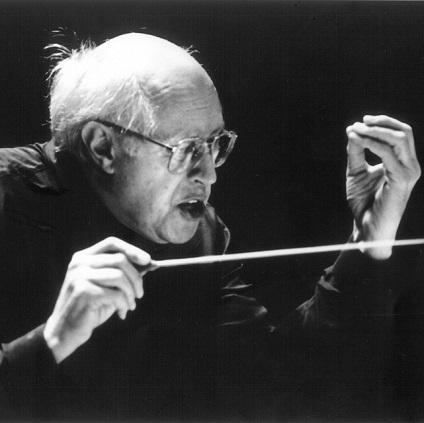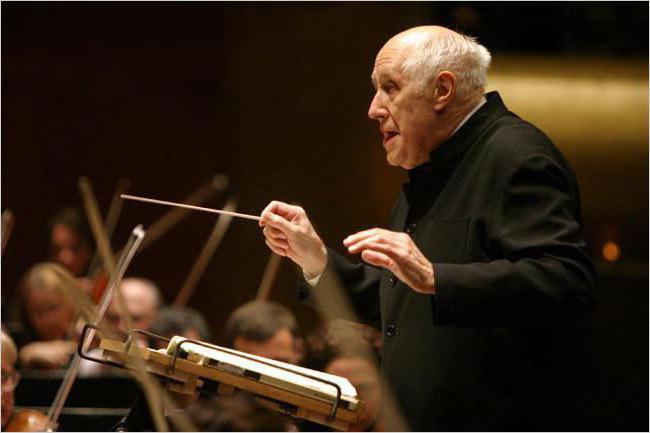Today the name of Mstislav Rostropovich is the name of one of the greatest academic musicians of the 20th century. He not only had a unique performing talent, but also was a principled person who opposed the policy of the totalitarian system of the USSR. For this, Rostropovich was expelled from the country. In the west, he made a career on a global scale, after which he returned to his homeland when communism had already fallen.
Childhood
The future conductor and cellist Mstislav Rostropovich was born on March 27, 1927 in Baku. His parents and grandfathers were musicians, so the future of the child was determined even before he was born. In the years 1932-1937. Rostropovich studied at the Gnesins school in Moscow. It was one of the best music educational institutions in the country.
With the onset of war in the capital, the mass evacuation of civilians began. I got into it and the 14-year-old Rostropovich. The biography of the conductor was connected with the city of Chkalov (Orenburg). The father of Mstislav died in the evacuation, and the teenager became the de facto head of the family. At the age of fifteen, he began teaching at a local music school and thus fed his relatives.
Then the first independent works appeared, which Rostropovich wrote. The biography of the beginning composer was marked by the creation of a poem for cello, piano concert and prelude for piano. During the war years, the musician became a touring artist. He performed with the Maly Theater Orchestra, performing works by Tchaikovsky. Rostropovich also gave concerts in military units, hospitals, district centers and collective farms.
Education
At the age of 16, the gifted performer entered the Moscow Conservatory, where he began to study the art of playing the cello and composing skills. His teacher was Semyon Kozolupov. He immediately noticed the potential that Rostropovich was hiding in himself. The biography of the musician could have gone differently if he had not ended up in the attentive and demanding hands of Kozolupov.
At the conservatory, Rostropovich met Shostakovich and showed him the score of his own piano concerto, and also performed it for clarity. Dmitry Dmitrievich appreciated the efforts of the young student and suggested that he study individually to improve his composing skills.
However, in the future, Rostropovich did not begin to compose his own music. The reason was simple. When he first heard Shostakovich’s eighth symphony, which made a tremendous impression on him, the cellist decided to give up on his composer future, realizing that he would never reach the level of a master anyway. Perhaps this was a youthful exaggeration, but Rostropovich made his decision. Time has shown that he made the right choice, as the whole world remembered him as a unique and inimitable artist.
Teacher
In 1945, the next All-Union competition of young musicians was held. I prize on it received Mstislav Rostropovich. The cellist’s biography was marked by the first award, although during his life he received a great many more. This success allowed the second-year student to immediately switch to the fifth. In 1950, the young performer won the Ganush Wigan competition in Prague.
At that time, he had already graduated from the conservatory and graduate school. Rostropovich quickly became a bright and enviable teacher. For 26 years he worked at the Moscow Conservatory and another 7 years in Leningrad. For three decades, Mstislav Rostropovich has learned many world-class professionals. Among them were Natalia Shakhovskaya, Natalia Gutman, Joseph Feigelson, Sergey Roldugin, David Geringas, Maris Villeroush, Ivan Monighetti, etc. Many of these students later became professors of the most prestigious music academies around the world.
Creativity of Rostropovich
What was remembered as a performer by Mstislav Rostropovich? The musician performed with a huge repertoire of works. His work can be divided into two groups. Firstly, Rostropovich was a cellist (ensemble and soloist), and secondly - a symphony and opera conductor. His talent was recognized everywhere - about 60 of the best composers in the world wrote works especially for Mstislav Leopoldovich. He was the first to perform more than a hundred cello works and gave about 70 premieres with an orchestra. Rostropovich made his debut as a conductor in 1957, when Tchaikovsky's "Eugene Onegin" was sold out under his strict guidance at the Bolshoi Theater. It was a resounding success.

In the Soviet period of his career, cellist Rostropovich toured throughout the USSR. He also performed as a chamber musician in an ensemble with David Oistrakh and Svyatoslav Richter. The singer’s wife was the opera singer Galina Vishnevskaya. Rostropovich often performed with her on the same stage, accompanying his wife. In 1951, the conductor received the Stalin Prize, in 1965 - the Lenin Prize, and in 1966 became the People's Artist of the USSR.
Solzhenitsyn’s defense
Mstislav Rostropovich, whose personal life was associated with many friends, was not afraid to defend them against a totalitarian state, even if he had to risk his position. In 1969, the composer sheltered the disgraced writer Alexander Solzhenitsyn at his dacha. By that time, the Khrushchev thaw had remained in the past , and the Brezhnev government began to poison the author of One Day, Ivan Denisovich, and other popular camp works.
The musician not only harbored Solzhenitsyn, but also wrote an open letter in defense of him, which he sent to the main Soviet newspaper Pravda. After that, cellist Rostropovich faced many problems. The authorities did not allow him to perform with large orchestras and did not allow him to tour abroad. The press began to ignore the cellist. In fact, he became a marginal and irreconcilable enemy for the Soviet state.
Life in the USA
In 1974, Mstislav Rostropovich and his wife Galina Vishnevskaya were expelled from the USSR. In 1978, they were deprived of Soviet citizenship. The whole story of the disgrace of the great musician began with an open letter to Pravda. Already after the fall of communism and his return to democratic Russia, Rostropovich said in an interview that he considers that gesture in defense of Solzhenitsyn to be the best thing in his life, since it was he who reconciled the conductor with his own conscience.

After leaving the Soviet Union, the musician with his family mainly lived in the United States. He was the father of two daughters. Olga and Elena Rostropovich were born in the 50s and left their homeland as children. In 1977-1994 the conductor led the Washington National Symphony Orchestra. Every four years, this team played at the inauguration ceremony of the US President. Rostropovich also regularly performed at festive concerts dedicated to Independence Day on July 4. In addition, he toured around the world. At the invitation, he performed with the main orchestras of France, Great Britain, Germany, Austria, Japan, etc.
World star
Rostropovich met his 60th birthday in Washington. In 1987, on the occasion of this date, the First World Cello Congress was held in the American capital. Then Ronald Reagan presented the conductor with the highest state award - the Liberty Medal. Even Queen of Great Britain Elizabeth II visited Rostropovich.
The musician was extrovert and cheerful by nature. Over the years of dizzying fame abroad, he has acquired an enormous number of high-ranking friends and pals. On his anniversaries the whole world musical elite gathered. Friends of Rostropovich were Picasso, Chagall, Dali, Galich and Brodsky. In 1994, when the conductor announced the end of his collaboration with the Washington National Symphony Orchestra, he held a grand gala concert. Letters of thanks were sent to Rostropovich by all the American presidents he met in his “post”: Carter, Reagan, Bush Sr. and Clinton.
Musician and citizen
In the West, Rostropovich became known not only as an unsurpassed musician, but also as a human rights activist. He often gave concerts in particularly problematic regions of the world. For example, in 1989, the maestro played one of Bach's cello suites at the Berlin Wall. In 1974, he won the prize awarded to him by the Human Rights League.
Meanwhile, the situation in the world was changing. In the USSR, a new leadership came to power, embarked on the path of reform. In 1990, Mikhail Gorbachev overturned the decree according to which Rostropovich and Vishnevskaya were deprived of citizenship, awards and honorary titles. However, the musician wanted to remain a "citizen of the world." He did not take back Soviet citizenship, and later Russian. In 1991, when, at the last breath of the Soviet system, the reactionaries staged a coup of the State Emergency Committee, Rostropovich flew specially from Paris to Moscow and joined the crowd defending the White House.
Career continuation
In the nineties and zero years, the performer continued to actively tour. Rostropovich's cello sounded in the largest cities in the world. As a conductor, he performed with The Queen of Spades in San Francisco, with the Tsar’s Bride in Monte Carlo and with Lady Macbeth in Munich. The musician again began to give concerts in Russia. In 1996, he performed at the Bolshoi Theater with Khovanshchina.
Rostropovich often recorded concerts for the radio. In 2003, he received his next Grammy Award. This time she was honorable - for “life on records” and “extraordinary career”. In total, Mstislav Leopoldovich won the Grammy Award five times. Throughout his career, critics have noted the artistry, emotionality, inspiration and filigree beauty of the maestro's game.
Rostropovich Foundation and Festival
In 2004, as a teacher, the conductor opened a school in Valencia, where he was taught the highest musical skill. Organizational abilities of the cellist were manifested in his ebullient activity and the creation of new festivals. Such events made it possible to discover new young names of talented performers for the whole world. Today, in memory of the great musician, the Rostropovich Festival takes place every year.
The conductor became president of his own foundation. His funds went to help gifted students. Thanks to him, new scholarships and grants for children-musicians appeared in Russia. Today, the music fund of the late father is headed by Olga Mstislavovna Rostropovich.
Help medicine
As a benefactor, Rostropovich also became known for his projects to help medical institutions in Russia. The Vishnevskaya-Rostropovich Charity Foundation has been involved in this activity. Today it is headed by the daughter of the performer, Elena Rostropovich.
In 2000, the organization began implementing a program to vaccinate children against hepatitis B. At that time, this was the first such initiative after the collapse of the USSR.
Death
In 2006, information appeared in the media about the deteriorating health of Mstislav Leopoldovich. The musician underwent an operation performed in Swiss Geneva. In December, the conductor was hospitalized after returning to Moscow from Voronezh.
He spent three months in the hospital. Soon after being discharged in March, the maestro celebrated his 80th birthday. He was deservedly congratulated by the most famous colleagues in the music department, politicians, public figures and old friends. The celebration itself took place in the Moscow Kremlin. Soon, the state of Rostropovich again worsened. April 27, 2007 he died. After the legend’s death, a music festival of Rostropovich takes place in Moscow every year.
Confession
Rostropovich was a member of the French Academy of Arts, the US Academy of Sciences and Arts, the Royal Academy of Music of England, etc. In more than 50 universities, the musician became a professor, and in dozens of cities around the world - an honorary citizen. France awarded him the Legion of Honor, and the Japanese Art Association noted the work of the conductor with the Imperial Prize. The British authorities made Rostropovich an honorary knight.
In the USA, the musician received the Presidential Medal, in Sweden - the Order of the North Star. In total, in his piggy bank there were state awards from 29 countries. On the eve of the 80th anniversary, Rostropovich received the Russian Order of Merit for the Fatherland, I degree.